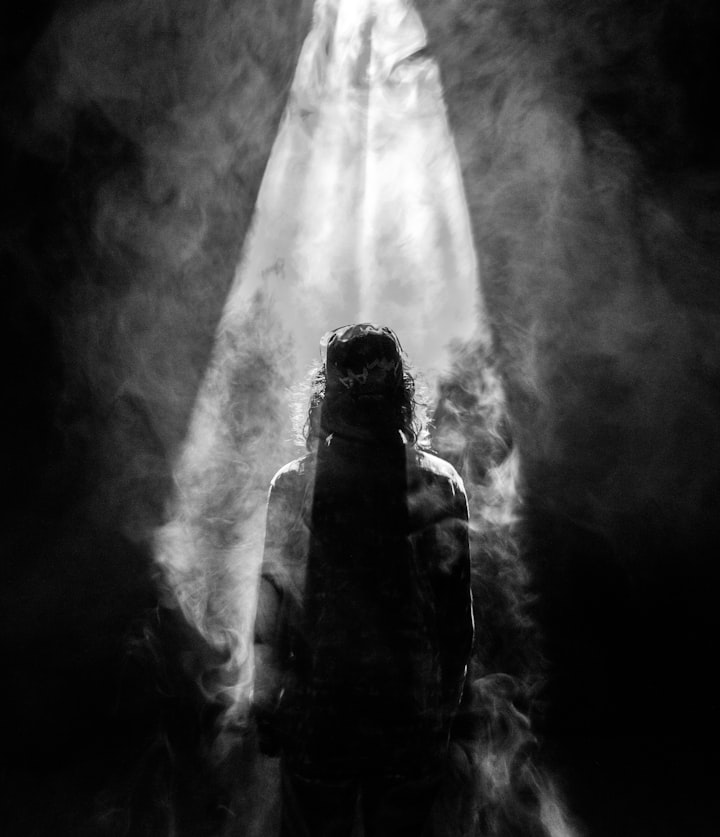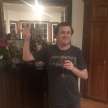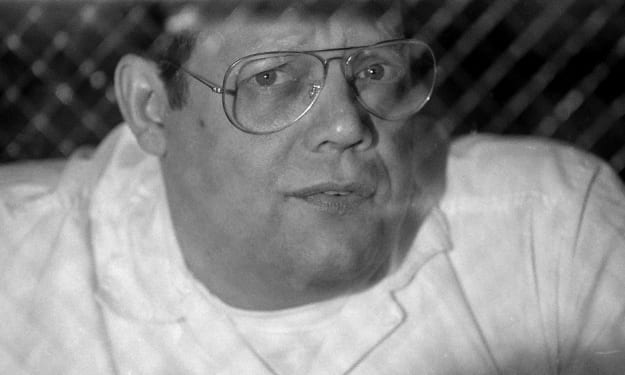Nearly All The Days Were Still (Episode III—It Came To Him)
By JGSV | Insinuating Fiction in the Time of Coronavirus, George Floyd, and Ghislaine Maxwell | Autumn 2020

Disclaimer from the Narrator — Speaker — Whatever: This is a work of fiction. Names, characters, business, events and incidents are the products of the author’s imagination. Any resemblance to actual persons, living or dead, or actual events is purely coincidental. Also, any relationships between consecutively narrated events are likewise purely coincidental; causality — either by natural or supernatural means — is in no way implied or intended to be construed by the percipient reader.
PREVIOUSLY ON NEARLY ALL THE DAYS WERE STILL: Episode 2. A teenage aspiring actor faces a tough choice in a school play about a mystery.
At that Catholic high school, the Writers' Union was the after school group dedicated to creativity and the power of imagination.
Mr. Hiller moderated it each Friday afternoon, in his own classroom, next to a large janitor's closet, on the extreme north end of the school's Priory wing.
(Remember that closet. In a later episode, it becomes important.)
More than one student from the Union had set off explosions around the rest of the school, because of pieces of original writing falling—or occasionally being freely, passive-aggressively, given —into reactionary hands.
There was, for example, the curious incident of the 2004 Spring Play.
Like show choir and West Side Story, the Narrator —Speaker —Whatever —would audition for that production unsuccessfully. He later went to see it, obliged by his friendship with Peter Marin from the Union. And he was prepared to hate the whole thing and feel bitter about how the play would have been funnier or better if only he had been given an onstage role.
The play was a farce about an accidental injury with a loaded gun that causes a fancy dinner party to devolve into paranoia and rumor-mongering, under threat of investigation by the police.
Peter Marin was not a Drama Club officer. He only ever auditioned for that one play, and received a part-cast opposite Brin Brown, who played his onstage wife. Brin, who as we have previously seen, was devoted to Drama with a Capital D.
Andrew LaBoone, a junior football player, was the other Drama Club outsider who auditioned just that one time.
Like Peter, he also received a part.
Peter and Drew, if you are wondering, had the shared distinction of having passed through not one but two years in Ms. Rilke's English class. They had her first for Advanced Junior sections during their third year, which finished with the spring play they both acted in as upset-outsiders. And they would continue in her room for Advanced Senior English, during the year that followed.
But all shall reveal itself in due course.
The night of the performance, the N/S/W nearly puked laughing, despite himself. The entire audience was in stitches, all the way up to the curtain call.
There was this one part in the middle of the play where Chad Ermengarde, the blond lumberjack-ish boy who the N/S/W then had a crush on, was playing the handsome attorney who has to answer the door when the police knock to investigate a report of gunshots in the vicinity. The gun in question has fired by accident, but caused a large enough injury in the private brownstone residence, somewhere in the Upper West Side of Manhattan, that the yuppie attendees of a fancy professional-posturing party are fearful it will get misperceived as a violent crime.
They are simply beside themselves, trying to cover up, for fear of the fallout that the negative publicity may have, on their reputations and public careers.
The perverse result is that their paranoid reactions have the precise effect of becoming increasingly suspicious-looking to the cops.
Onstage, the cop, played by Drew LaBoone, was knocking on the door of the brownstone. Chad's character was supposed to look panicked.
"The police are at the door! Quick, put on some music, and make it look like we've all just been dancing and socializing!!"
Dory McDonald was playing Chad's onstage wife, another attorney. She struck up the onstage LP-player, but the offstage sound cue for dancing malfunctioned. The running crew and sound guy were flummoxed as to the glitch's cause.
Yet still, onstage the seconds ticked by.
Nearly all the days were still.
So Chad began covering with improv:
"Oh no! the record player is broken! WHAT ARE WE GONNA DO NOW??"
Dory thought aloud:
"We can't dance if there's no music playing, because that would be weird. So um, let's, um… let's… let's SING WHILE WE DANCE!!"
And with that, she grabbed Chad's necktie, and dragged his handsome face by it, to spin him around and around and around the stage, almost like he was a story she was spinning on the spot, to get them both out of a tight corner: a wild tango tapdance in which she was the brothel madam, steering him, the obedient boy toy.
Dory vocally accompanied by chanting "LA LALA LALA LALA LALA LALA LALA LALA…….. . . . . . . ." like a hyena in a cartoon slapstick short.
Andrew LaBoone, in the role of the cop, saw that unexpected sight arise to his wondering eyes, standing inside the door that another actor then opened, because of his fateful knocking.
The N/S/W died.
Everybody in the theater died at that moment. Paroxysms of uncontrollable laughter rolled above the heads of the audience, and reached further upward into space, to shake dust loose from the catwalk, that had previously only been vexed to a nightmarish awakening by the sound of Mrs. Worden's screams during musical rehearsals for West Side Story.
It all happened by chance—by the random yet graceful unraveling of fate.
That spring play turned out, in the manifestation, to be a stroke of veritable comedic genius. But in so doing, it narrowly avoided apocalypse-by a silver lining of saving grace.
And at the heart of all those mistakes-turned-comedic-genius was a shared awkwardness that afflicted both the cast and crew, because of a mutual grudge that still persisted between Peter Marin and Brin Brown, about a document.
It was written back in November 2003, for Ms. Rilke in Advanced Junior English. For a class assignment, Peter had composed a piece of writing about which Brin's opinion could be said to matter - and printed it off the school printers, and given it freely, passive-aggressively, into hands that proved reactionary.
All the lasers in that curious institution made the same delayed whirrrrr-ing sound, and on still days-and nearly all the days were still-seemed to resound throughout the entire system of connected devices from which an incriminating document got printed.
Oh dear; what an awkward situation.
The memory of whatever had gone down because of that incriminating document was so sublime - so trite - so horrible - that Brin's and Peter's mutual distrust of each other persisted, long after the fact.
It was a stink, a tinge, a blush: an atmosphere, of such peculiar eeriness that it reflected discomfort for everybody who even just had to stand near them together for any amount of time.
All of the onstage chicanery—the technical glitch resulting from the crew's discomfiture, and the increasingly frenzied improv from Chad and Dory (who also, incidentally, took Rilke's class in their own time) to try and cover it up - resulted from the reflected awkwardness, perceived as a churning, a blotch, among the other company members, of how furious Peter and Brin still were with each other, over whatever had gone down in Ms. Rilke's class, five months earlier.
But all shall reveal itself in due course.
Near the end of the 2004 spring semester, Peter Marin asked for something that nobody had dared to ask for before.
Now here's the thing about Peter: a previous associate head once referred to him, unironically, as a "Walking Talking Disrespect Machine." His personality in school was akin to that of a folk hero. Reviled by most, but revered by those whose opinions could most be said to matter, his sudden displays of brutal honesty and derring-do occurred at what seemed to be precisely chosen dramatic moments during the school day.
In a children's fairytale, Peter would undoubtedly have been the little boy whose studied nonchalance leads to his getting eaten alive by a lion ("I Don't Care!")—only to get vomited back out again, having given the lion food poisoning.
But this was Peter, the teenager. He was a member of the Union, and had cultivated a somewhat astonishing reputation for tap-dancing, sometimes literally, his way out of many a tight corner with irate teachers, administrators, and other students, who happened to catch the sharp end of his words, spoken aloud, or written down and given freely-passive-aggressively-into reactionary hands.
Peter asked Tim Kohl for a summer internship in IT administration.
That was Mr. Kohl's role in that curious institution: administering, maintaining, and troubleshooting the school's collection of computer labs, and the software infrastructure that connect them to each other and the outside world. The very existence of the post was a relatively recent development. Because of that, there was no policy regarding student internships in the matter.
As mentioned, about two thirds of the school population as a whole dearly hoped Peter would not let the door hit him on the way out, through expulsion. But the remaining third always somehow turned out to include the individuals among students, teachers and administrators, whose opinions could be said to matter most.
There was no policy in the school handbook that said Mr. Kohl couldn't engage Peter, or any student for that matter, for a summer internship. You know, if they asked.
And after all: why not?
The evidence will show that Mr. Kohl neglected to ask this question of at least two thirds of the school.
The policies on student access to administrative databases, it is to be feared, had not yet caught up with the accelerating innovations of that brand-spanking new technology.
Thus it came to pass that in the course of that internship summer, Peter assisted Mr. Kohl with updating the systems and administering the school intranet. As part of his duties, he acquired knowledge of the most jealously guarded passwords to the most compromising information about other members of the school community: transcripts, disciplinary reports, employment reprimands, mental health histories, skirmishes with public authorities and law enforcement - and that was just the beginning.
Peter had it all at his fingertips.
Also: a ring came into Peter's possession.
An actual ring.
It came to him.
So Peter sometimes said, making an odd gulping sound with his throat, recounting the story over and over and over again across the years that followed.
Nobody among the many who heard him could be quite sure if he was joking or serious in the telling.
Mr. Kohl gave it to him.
That ring was a fob containing the keys to open doors, perhaps literal, perhaps figurative, whose significance will unravel in the conclusion of this brief, uneasy, biased history.
The ring would remain in Peter's possession, even after Mr. Kohl's own sudden departure from the school, during the academic year that followed.
Magic must be believed, Mr. Hiller used to say during Union meetings.
That's only way for it to be real.
NEXT EPISODE: An enigmatic teacher advocates extreme favoritism, and uses a popular athlete as an example, for her students. Stay Tuned!
About the Creator
Joseph G. Smeall
Masters' Candidate at Columbia. Writer of banned books that everybody talks about. Bard-Historian of untold stories and unsung heroes (and the odd unpunished villain). Scribe of incriminating quotations. Ask me to tell you a story.






Comments
There are no comments for this story
Be the first to respond and start the conversation.